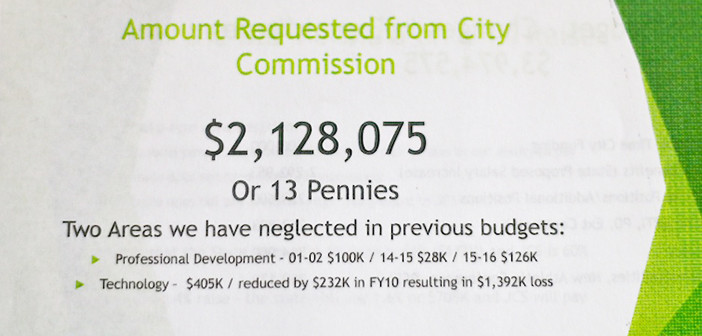By Jeff Keeling
A year after a tense budget process with the Johnson City Commission, Johnson City Board of Education members are hopeful things will start on a better footing when they introduce their fiscal 2016 proposal Thursday night. Reasons for hope, board chair Kathy Hall said, include efforts in the past year to find efficiencies – a commission request – and the introduction of a five-year pro forma budget, another commission request.
Commissioners will hear a bottom line request of $2.1 million in additional city funding – a 22.6 percent increase from $9.41 million to $11.54 million. The commission increased local funding by $500,000 last year. The budget proposal includes a 4 percent across-the-board cost of living raise for employees (there wasn’t one last year), plus increased funding for professional development and technology.
“We’ve definitely tried to give the commission the information they need,” Hall said following an April 22 board workshop to plan for Thursday’s presentation. “They’ve asked us to look at a few areas, and we’ve done that, too.”
The board established an efficiency committee, which met monthly, found some small savings in several areas, and was an overall success, Hall said. “We identified some ways that we might do things differently, and we answered some longstanding questions of, ‘would it be better if?’”
Hall will present the bulk of the budget proposal, while fellow board member John Hunter will outline the pro forma budget for fiscal years 2017 through 2021. It anticipates annual increases in the city’s share of funding – after forecast revenue growth – in the 6 to 7 percent range. It is the first time Hall can remember the board providing such a document.
“Things change every year, but there are trends, and the pro forma is really an attempt to show the commission, barring any unforeseen circumstances and assuming that we are brought up to a balanced budget this year, this is what we will need moving forward,” Hall said.
While a 22 percent increase for the coming year may seem steep, Hall said it comes on the heels of a year in which the schools took a major hit from their requested funding levels. The reality, she said, is that several factors, including flat local tax revenues, have created an annual budgeting process with inevitable difficulties.
“A lot of things converged to make school funding more difficult,” Hall said. “Some of that was the economy, some of that was unfunded mandates, some of that was an ever-changing legislature that is asking us to do more with less.”
All told, personnel costs comprise more than 80 percent of the system’s budget. Johnson City pays its teachers well relative to state averages, and funds positions for which the state doesn’t provide even partial funding.
“Our job is to try to make the school system the best that we can,” Hall said. “The commission has to balance that with all the other needs of the city.”
Were the City Commission to fund the schools’ request and not shift money from other expense areas or find new revenue sources, the amount would require an additional 12 to 13 cents in property tax. That, in turn, would increase the city tax bill for the owner of a home assessed at $200,000 by $60 to $65. The pro forma budgets through 2021 forecast increases at roughly one-third this year’s amount.
Hall noted, as she will Thursday, that Johnson City’s schools have the lowest per pupil spending of any local city school system, at $9,392, and one of the state’s lower administrative costs as a percentage of overall budget.
“When I saw that figure ($2.1 million) I was pleasantly surprised,” she said.





